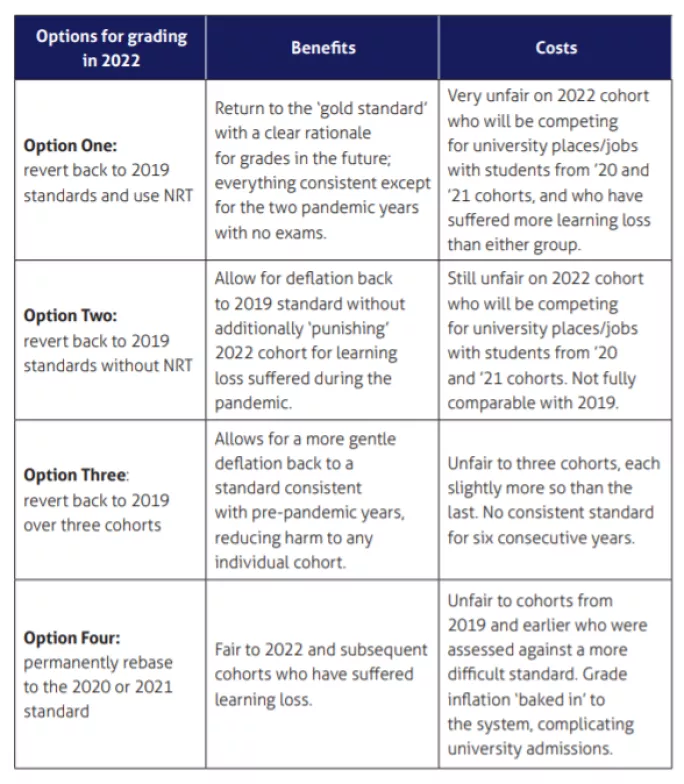
GCSEs 2022: Pegging grades to 2020 ‘fairest’ option

The fairest option for GCSE and A-level grades next year is to peg them to 2020 levels, rather than 2019 standards, according to a report written by a respected education figure.
The report, by the Institute for Government and written by former Department for Education adviser Sam Freedman, says that the past two years of cancelled GCSEs and A levels have “led to significant grade inflation” in the system, with individual students treated unfairly.
A levels: Numerical grades ‘unrealistic’ say heads
A levels 2021:
- 2021 A level results at a glance
- Disadvantage gap widens for poorer pupils
- Under 1% of teacher grades changed by boards
There have been suggestions that grading should revert to 2019 distributions, the last year when full public exams are held.
But the report recommends that grades in 2022 should be tied to 2020 outcomes, “rather than reverting to the 2019 grades as a baseline”.
“Pupils in 2022 are more likely to be competing for university places (and thereafter) graduate jobs with the 2021 and 2020 cohort than the 2019 one; on balance, this outweighs concerns around unfairness on earlier cohorts and ‘baking in’ grade inflation,” it adds.
The report also says that:
- Whatever decision made about standards, this must be communicated clearly to employers and universities so that they understand the differences between cohorts.
- Ofqual should publish a resilience strategy in 2022 so that England’s schools are better prepared for future crises, looking options such as essays written earlier during the course and marked in a rank order using comparative judgement.
- DfE and Ofqual should conduct a full review of secondary assessment to consider “broader reform, particularly of GCSEs”. It adds that “the recent controversies mean there is a risk that the exams system as a whole becomes entirely undermined, possibly even being scrapped by a future government”.
It says that Ofqual “chose not to address” anomalies introduced by algorithm-moderated grades in 2020.
And it adds that the DfE “hoped to run exams in 2021, with some adjustments designed to acknowledge lost learning during Covid-related school absences”.
‘Obstinence’ over Plan B for 2021 GCSEs and A levels
“It was so determined to do so that it refused to engage in any public conversation about a ‘Plan B’, or according to a No.10 insider conduct any contingency planning at all, if exams did need to be cancelled,” it adds.
“This obstinance meant when they were again cancelled, in January 2021, Ofqual had few options but to revert back to teacher-awarded grades.”
The report says that mitigations for exams in 2022 - such as a choice of options in GCSE geography - have been announced “late” and could leave some schools at a disadvantage, and that these will not be enough to “fully address” learning loss for the cohort next year.
It also warns that, in the case of a sudden switch back to 2019 standards, grades could be lower in 2022 than they were in 2019.
“Given Ofqual’s legal duty to maintain standards, the most technically correct approach would be to use the 2019 results as the benchmark for comparability and then use the National Reference Test (NRT) to assess whether standards have really improved or fallen,” it says.
It adds: “The amount of learning lost through the pandemic makes it likely that real standards will have fallen to some degree - so a correct application of comparable outcomes in 2022 would lead not just to significantly lower results than 2021 but likely lower than 2019.”
A further option, the report says, could be to return to the 2019 standard over a few years, but that this would be “ethically and politically tricky” as many year groups would end up with an “arbitrary” basis for their grades.

Setting out the various options, the report suggests that a return to 2020 standards may be the fairest.
“On balance we recommend option four using grades from 2020 rather than 2021, as this year’s results are so high as to make the university admissions system potentially unworkable,” it says.
“We choose this option for two reasons. First, it would not be fair to build the impact of learning loss into results for 2022 cohorts, which would happen if Ofqual followed its comparable outcomes policy to the letter.
“Second, the 2022 cohort is more likely to be competing against pupils from 2021 and 2020 than 2019, both for places in higher and further education and for graduate jobs.”
It adds that this comes with disadvantages, especially for the recently-reformed GCSEs - employers assessing candidates who sat GCSE in 2015, 2018 and 2022 would need to understand the respective differences in grading standards.
You need a Tes subscription to read this article
Subscribe now to read this article and get other subscriber-only content:
- Unlimited access to all Tes magazine content
- Exclusive subscriber-only stories
- Award-winning email newsletters
- Unlimited access to all Tes magazine content
- Exclusive subscriber-only stories
- Award-winning email newsletters
You need a subscription to read this article
Subscribe now to read this article and get other subscriber-only content, including:
- Unlimited access to all Tes magazine content
- Exclusive subscriber-only stories
- Award-winning email newsletters
- Unlimited access to all Tes magazine content
- Exclusive subscriber-only stories
- Award-winning email newsletters
topics in this article



